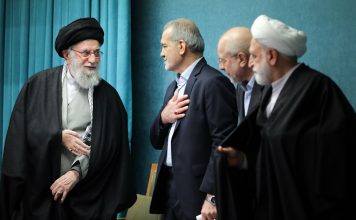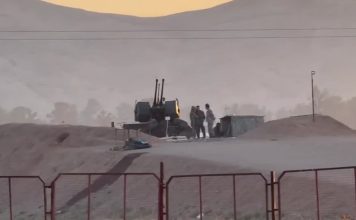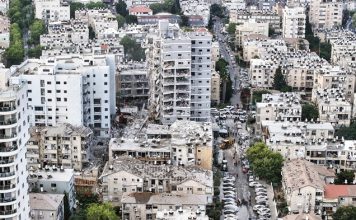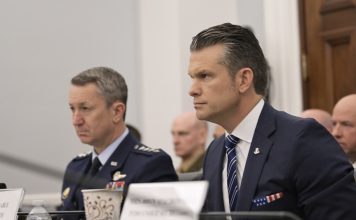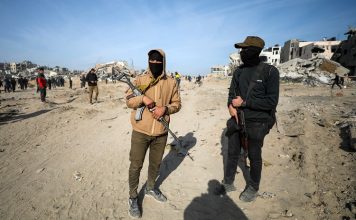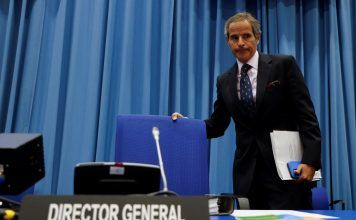
By Kayhan Life Staff
On April 13, Iranian security forces, including the Basij (volunteer militias) and units from an Iranian state board on moral propriety — the Enjoying Good and Forbidding Evil HQ — began a new wave of suppressing girls and women. This crackdown was performed with the backing and directives of relevant institutions, all under the guise of enforcing the “hejab law.”
Operation Noor, which has been criticized as a misnomer, has granted these state forces increased power to intimidate and harass the female population in Iran. Simultaneously, serious crimes such as institutional corruption, theft, and murder are on the rise in the country.
Despite these issues, Brigadier General Ahmadreza Radan, commander of the Law Enforcement Command of the Islamic Republic of Iran (FARAJA), during a meeting with other senior commanders, described the implementation of the Noor Project as “the most sensitive mission for this force.”
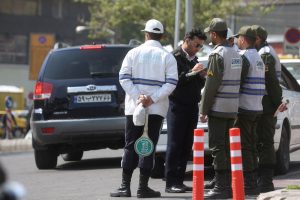
The Morality Police units in Iran, as part of the Noor Project, have been increasing their presence and patrol hours in big cities, mainly targeting women and girls who exercise their right to wear what they want. These units work closely with plainclothes security personnel and have been reported to harass and terrorize individuals in various locations, including Valiasr Square in Tehran, until 22:00. Officers reportedly patrol pedestrian bridges.
FARAJA units collaborate closely with the Morality Police, plainclothes security agents, and Basij forces, some of whom reportedly hold full-time positions in government agencies. These units reportedly enter establishments like restaurants, coffee shops, shopping malls, and arcades in large numbers and without a warrant to film the public. They target individuals perceived as violating hejab rules, harassing and warning them.
In Tehran, there have been reports of plainclothes agents functioning as informants for the police force. These agents engage in covert surveillance activities, such as secretly filming individuals at shopping malls and other public spaces. The information gathered through these operations is then used by the police to enforce regulations, such as the requirement for businesses to implement a mandatory hejab policy within their premises.
The covert surveillance and subsequent enforcement actions by the police sparked outrage among store owners of the Tirajeh-2 Shopping Center in Tehran, who held a mass protest on the mall’s ground floor on April 24th.
Iranian girls and women have shared disturbing accounts of experiencing severe verbal and physical attacks by officers following the initiation of the “Noor Project.” According to their testimonies, the Morality Police subjected them to egregious treatment, including coercing them to transfer money to a bank account for their release while being detained inside police vans.
When the leader of the Islamic Republic issues orders for repressions and confrontations, it triggers a series of actions and responses from various government institutions and authorities. These actions are often accompanied by propaganda efforts aimed at shaping public opinion. Several vital points are noteworthy in such situations.
In a recent decree by Iran’s Supreme Leader Ayatollah Ali Khamenei, a new wave of harassment of women and girls under the pretext of the hejab rule has started. During a speech marking the Eid al-Fitr on April 10, Khamenei highlighted the importance of upholding religious norms and called for strict enforcement of these regulations.
“We should not be lenient regarding the violations of religious norms. Authorities, the public, and the Enjoying Good and Forbidding Evil HQ must fulfill their duties,” Khamenei said.
Given historical context and recent incidents, it is not surprising that some officials have warned that “a rigorous enforcement of the mandatory hejab would antagonize the public.”
In comments published by the Tehran-based Khabar Online on April 24, Masoud Pezeshkian, a member of the Majlis (Iranian Parliament) representing the Tabriz electoral district in the northwestern province of East Azerbaijan, said: “Force and the current approach will have the opposite results. Observing hejab is a principle, but how we convey this message is another matter.”
The increased harassment of girls and women by the police and security forces in Iran has led to the public blaming Khamenei for the situation. The stringent measures enforced by the state security apparatus have sparked protests in various cities nationwide.
Footage of an incident at Tehran’s Haft Tir metro station captured and posted on X (formerly known as Twitter) showed commuters at the station shouting at the police to release a woman arrested for a “hejab violation.”
Senior officials were quick to shift the blame away from leader Khamenei because of the harsh treatment of protesters.
VIDEO: Islamic Republic Officials Are Accused of Crimes Against Humanity
In a post on X on April 19, Mehdi Fazaeli, the deputy chief of the Office for the Preservation and Publication of the Works of the Leader of the Revolution, emphasized the importance of strategic planning in response to perceived threats.
Fazaeli Said: “The enemy has a plan, and we must also have a plan. No arbitrary or unprepared work should be done. Recently, some officials have been warned because of their unplanned actions.”
Some hardliners, such as Hossein Shariatmadari, the editor-in-chief of the ultra-conservative Tehran-based Kayhan newspaper, disagreed with Mr. Fazaeli’s comments.
Mr. Shariatmadari stated that the leader’s office did not have a spokesperson, and that there was no need for such a warning. He noted that Khamenei’s Chief of Staff, Gholamhossein Mohamad Golpaygani, and the Deputy for Political Affairs at Khamenei’s office, Seyed Ali Asghar Hejazi, would directly inform relevant officials and the public.
Essentially, when a member of Khamenei’s office attempted to defend him against accusations of violence towards women, Hossein Shariatmadari boldly spoke the truth.
Mohammad Ali Jafari, the current head of the Islamic Revolutionary Guard Corps (IRGC)’s Baqiyyatullah Cultural HQ, has acknowledged the potential for errors in cultural missions, explicitly mentioning the Noor Project.
Despite this recognition, Mr. Jafari emphasized the importance of “not condemning the entire project” and instead encouraged continued support for the initiative. He asserted that any “deficiencies would be rectified under the leadership and guidance of the leader.”
There is evidence suggesting that there are opposing views within specific segments of the government regarding the enforcement of mandatory hijab, leading to the harassment of women. Some officials have objected to this practice in interviews and public statements, but more severe opposition is likely within the government’s hierarchy.
During a meeting on April 24, Hojatoleslam Mohammad Movahedi-Azad, Iran’s prosecutor general, emphasized the government’s dedication to enforcing the Hijab and Chastity Law and the Noor Project. He commended judges who have publicly declared their intention to prosecute lawbreakers. He sternly warned foreign agents and individuals disregarding the law, stating that the authorities would take firm action against them.
Mr. Movahedi-Azad’s remarks shed light on the stance taken by some judges regarding women and girls accused of violating the “hijab law.” His comments suggest that some judges have refused to rule against these individuals, revealing a potential shift or resistance within the judiciary system toward enforcing such laws.
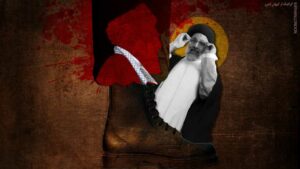
On July 6, 2022, Iranian President Ebrahim Raisi ordered the Supreme Council of the Cultural Revolution to enforce the “Hijab and Chastity Law.” Mr. Raisi accused the “enemies of Iran and Islam” of using global TV channels and social media to “spread corruption and target cultural, religious principles.”
While the hijab became compulsory after the 1979 Islamic Revolution, the Supreme Council of the Cultural Revolution, which adopted the Hijab and Chastity measure in 2005, is not a legislative body and cannot pass any laws.
During the Noor Project launch, news outlets covered the story of Seyed Hossein Hosseini, the goalkeeper and captain of Tehran’s Esteghlal Football Club (formerly Taj). His act of supporting a female fan who ran onto the football pitch to meet him raised concerns for the government.
After Esteghlal’s win over Aluminum Football Club in a match held in Arak on April 12, a young girl ran onto the field to hug Hosseini, only to be intercepted by security personnel. As the team captain, Hosseini had a professional responsibility, typical among athletes, to protect his fans from the officials’ violence. Several Esteghlal staff members stood by Hosseini and confronted the security officials.
Following the disciplinary committee’s decision to fine Hosseini $5,000, he assured reporters he would happily pay the fine. This statement raised concerns within the government because of Hosseini’s prominent religious standing and his moniker ‘Seyyed’ among his supporters.
Hosseini’s decision to defend the female fan significantly boosted his popularity among the public. Even supporters of rival teams commended his actions. During an interview, Iranian pop singer Kouros expressed his support for Esteghlal’s captain and offered to cover his $5,000 fine.
Mansour Rashidi, the former goalkeeper, and captain of Esteghlal FC, expressed his disbelief at Hosseini’s suspension for supporting a 13 or 14-year-old female football fan. He questioned the legality of such a decision and highlighted the lack of clarity on why Hosseini was penalized for this incident.
Mr. Rashidi also drew attention to what he perceived as a double standard in the treatment of individuals in positions of power, citing the example of former Iranian President Mahmoud Ahmadinejad, who faced no repercussions after he hugged the mother of former Venezuelan President Hugo Chavez at his funeral.
Hosseini, an Iranian national football player, defended a “female fan” during a match just a few days after the birth of his daughter. He showed unwavering support for women’s rights and gender equality in Iran.
Hosseini notably expressed limited support for the 2022-23 national uprising. However, when faced with the responsibility of being an athlete, a citizen, a human being, and an Iranian man, he did not hesitate to defend the rights of a female football fan.
The incident involving Hosseini was used as a pretext to prohibit women from entering football stadiums. The authorities in various provinces viewed the incident not just as an isolated case of defending a female fan, but as a broader movement supporting women’s rights. As a result, they declared women would be barred from attending future matches. If enforced, this decision may provoke a response from the International Association Football Federation (FIFA).
The public, apart from those who support the current regime, holds the belief that because of the government’s inability to match Israel’s military strength and its reliance on ineffective rhetoric calling for the destruction of Israel, it redirects its frustrations toward the Iranian populace.
In a climate where the authorities fear a resurgence of protests, enforcing restrictions on clothing choices has become a tactic used to maintain street security through exercises conducted by the police and security forces. This has led to instances where defenseless girls and women are subjected to physical violence, verbal abuse, and insults.
Prince Reza Pahlavi attributes the latest brutalization of the public in Iran to the Islamic Republic’s “fear, desperation, and the regime’s growing defeat domestically and internationally.” He argues that the failure of the “fake elections,” “unsuccessful missile attack on Israel,” “inability to defend the country’s airspace,” and economic crisis are all consequences of corruption and incompetence within the regime.
In an unprecedented address to the “men of the country,” Prince Reza conveyed a powerful message urging solidarity and protection for Iran’s women.
“Today, more than ever, it is crucial to support the sisters, mothers, daughters, wives, and all the women of Iran. The one perpetrating harm against Iranian women in this orchestrated aggression is the enemy — your enemy and Iran’s enemy,” Prince Reza said.
“Defending the women of our nation is both a human and national obligation. Those who advocate for Iranian women follow in the footsteps of a long line of heroes from our illustrious history. The courageous men who resisted aggressors were the ‘Immortal Guard’ of Iran, ensuring that the land and legacy of Iran endure eternally,” he added.
The language employed in this communication specifically urges the “men of the country” to fulfill their duty in addressing acts of aggression and harassment against women. They are called upon to perform their “human and national duty” by protecting Iranian women from the oppressive actions of the Islamic Republic.
The Immortal Guard of Imperial Iran, also known as the Imperial Guard, was established in 1942 by the late Mohammad Reza Shah Pahlavi. The unit was named after the Immortals, an elite unit of 10,000 Persian soldiers in the army of the Achaemenid Empire (550 BC-330 BC).
Prince Reza Pahlavi : ‘The Alternative to the Islamic Republic is the Iranian nation’

